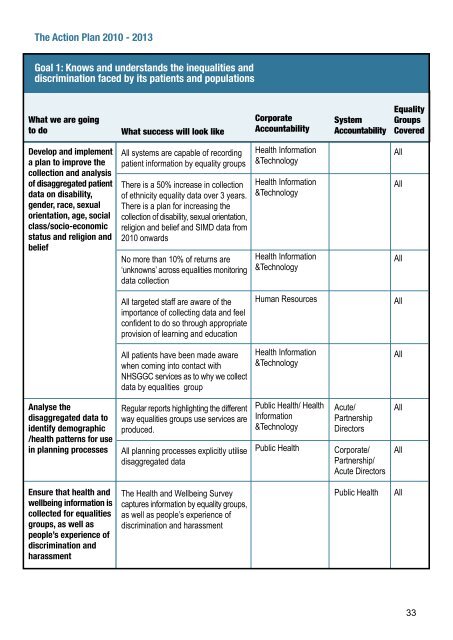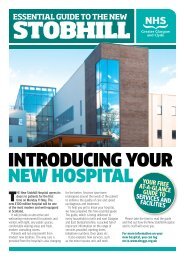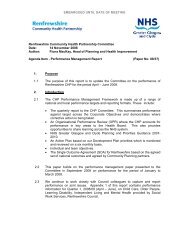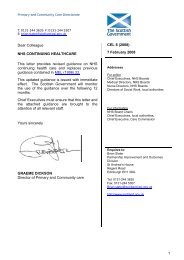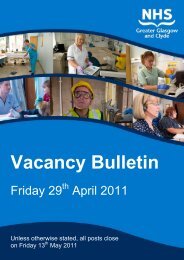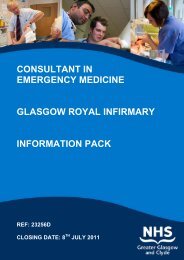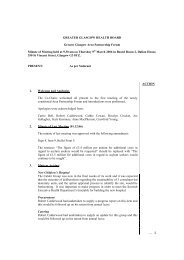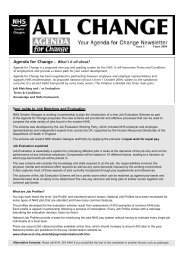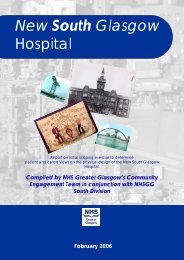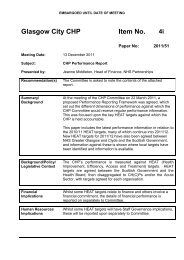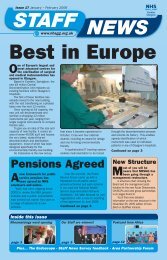NHSGGC Equality Scheme - NHS Greater Glasgow and Clyde
NHSGGC Equality Scheme - NHS Greater Glasgow and Clyde
NHSGGC Equality Scheme - NHS Greater Glasgow and Clyde
Create successful ePaper yourself
Turn your PDF publications into a flip-book with our unique Google optimized e-Paper software.
The Action Plan 2010 - 2013<br />
Goal 1: Knows <strong>and</strong> underst<strong>and</strong>s the inequalities <strong>and</strong><br />
discrimination faced by its patients <strong>and</strong> populations<br />
What we are going<br />
to do<br />
What success will look like<br />
Corporate<br />
Accountability<br />
System<br />
Accountability<br />
<strong>Equality</strong><br />
Groups<br />
Covered<br />
Develop <strong>and</strong> implement<br />
a plan to improve the<br />
collection <strong>and</strong> analysis<br />
of disaggregated patient<br />
data on disability,<br />
gender, race, sexual<br />
orientation, age, social<br />
class/socio-economic<br />
status <strong>and</strong> religion <strong>and</strong><br />
belief<br />
All systems are capable of recording<br />
patient information by equality groups<br />
There is a 50% increase in collection<br />
of ethnicity equality data over 3 years.<br />
There is a plan for increasing the<br />
collection of disability, sexual orientation,<br />
religion <strong>and</strong> belief <strong>and</strong> SIMD data from<br />
2010 onwards<br />
No more than 10% of returns are<br />
‘unknowns’ across equalities monitoring<br />
data collection<br />
Health Information<br />
&Technology<br />
Health Information<br />
&Technology<br />
Health Information<br />
&Technology<br />
All<br />
All<br />
All<br />
All targeted staff are aware of the<br />
importance of collecting data <strong>and</strong> feel<br />
confident to do so through appropriate<br />
provision of learning <strong>and</strong> education<br />
Human Resources<br />
All<br />
All patients have been made aware<br />
when coming into contact with<br />
<strong><strong>NHS</strong>GGC</strong> services as to why we collect<br />
data by equalities group<br />
Health Information<br />
&Technology<br />
All<br />
Analyse the<br />
disaggregated data to<br />
identify demographic<br />
/health patterns for use<br />
in planning processes<br />
Regular reports highlighting the different<br />
way equalities groups use services are<br />
produced.<br />
All planning processes explicitly utilise<br />
disaggregated data<br />
Public Health/ Health<br />
Information<br />
&Technology<br />
Public Health<br />
Acute/<br />
Partnership<br />
Directors<br />
Corporate/<br />
Partnership/<br />
Acute Directors<br />
All<br />
All<br />
Ensure that health <strong>and</strong><br />
wellbeing information is<br />
collected for equalities<br />
groups, as well as<br />
people’s experience of<br />
discrimination <strong>and</strong><br />
harassment<br />
The Health <strong>and</strong> Wellbeing Survey<br />
captures information by equality groups,<br />
as well as people’s experience of<br />
discrimination <strong>and</strong> harassment<br />
Public Health<br />
All<br />
33


